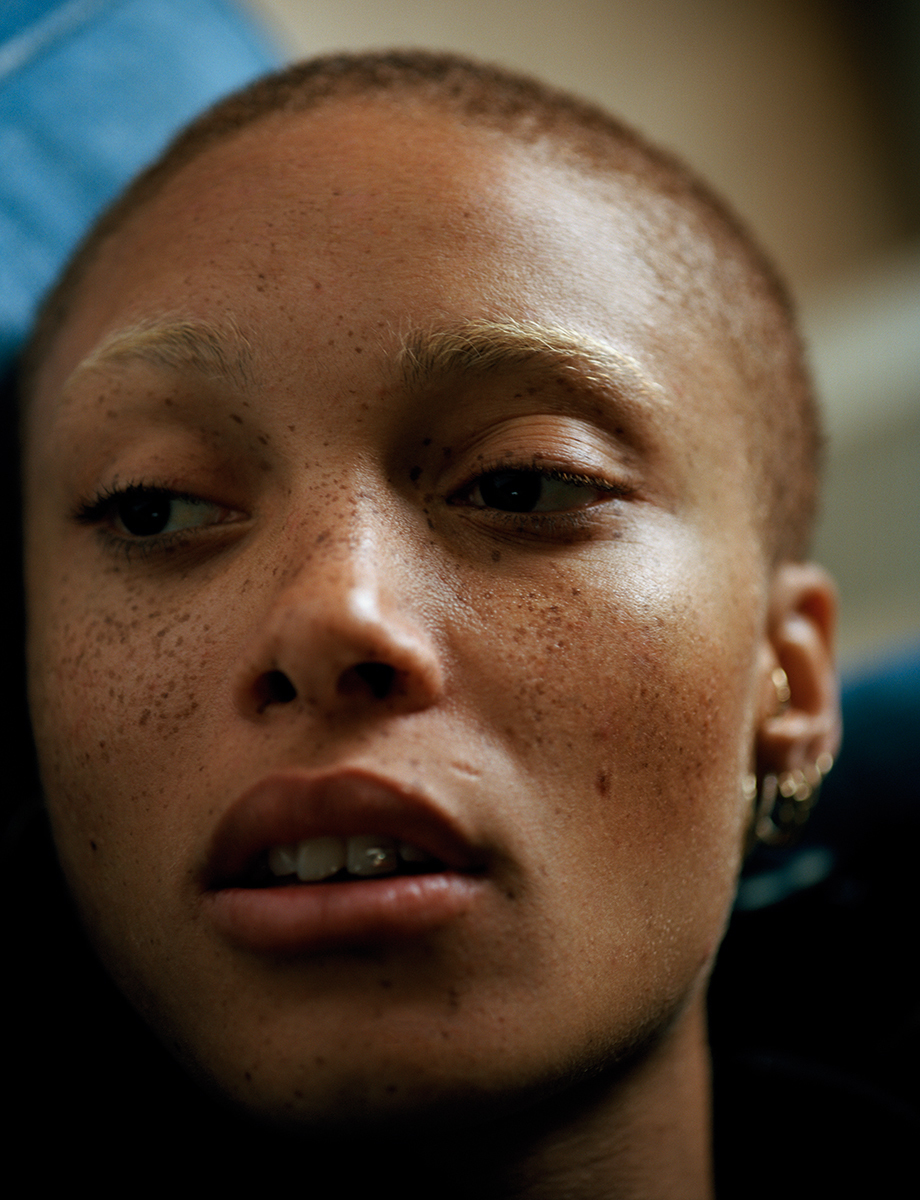“Gurls Talk is for every girl who’s growing up and needs someone to talk to,” says Adwoa Aboah, the 24-year-old model and actress harnessing the internet as a tool for change. With her shaved head, feline eyes, and freckles, Adwoa has an unforgettable face; she’s beautiful. Team this with her warmth and amazing sense of style and you’d be forgiven for thinking she’s got life sorted: self-assured and confident. But looks can be deceiving, and the past two years have seen the model face the hardest and darkest days of her life. Struggling with depression and addiction, she’s been in and out of rehab, culminating in a suicide attempt at the end of 2014. Thankfully, out of tragedy comes triumph, and now sober, Adwoa is determined to use her experiences to provide other girls with a safe space to talk about the issues we all face growing up, a space where they can share their worries, and use female creativity as a tool for change.
Born in west London in 1992, Adwoa grew up surrounded by fashion. Her mother, Camilla Lowther, is the founder of CLM, the agency responsible for launching and managing the careers of some of the most celebrated photographers and image-makers in the fashion industry, and her father, Charles Aboah, owns a location scouting company. Adwoa first started experimenting with drugs in her early teens. What started as a bit of fun however quickly escalated and by the time she enrolled at university, she was using heavily. On graduating in drama from Brunel, Adwoa’s parents recognized she needed help and sent her to the Cottonwood Addiction Rehab and Behavioural Health Treatment Center in Arizona. On returning to London she moved into the Start2Stop rehabilitation center, where she attempted to re-enter life (“as though nothing had happened”) but soon relapsed, despite losing a close friend to an overdose just months earlier. At the time, Adwoa was running AAMO casting agency with her good friend Madeleine Østlie and doing a bit of modeling on the side. Losing out on jobs and being judged on her appearance contributed to her growing feelings of self-worthlessness, and in October 2014 she attempted to take her own life with an overdose. “I was so lost and walking someone else’s path,” she says. “I was completely side-tracked with what everyone else was doing and I just didn’t want to be me anymore.” She spent four days in a coma, before being moved to a psychiatric hospital, where she spent the next month in recovery.
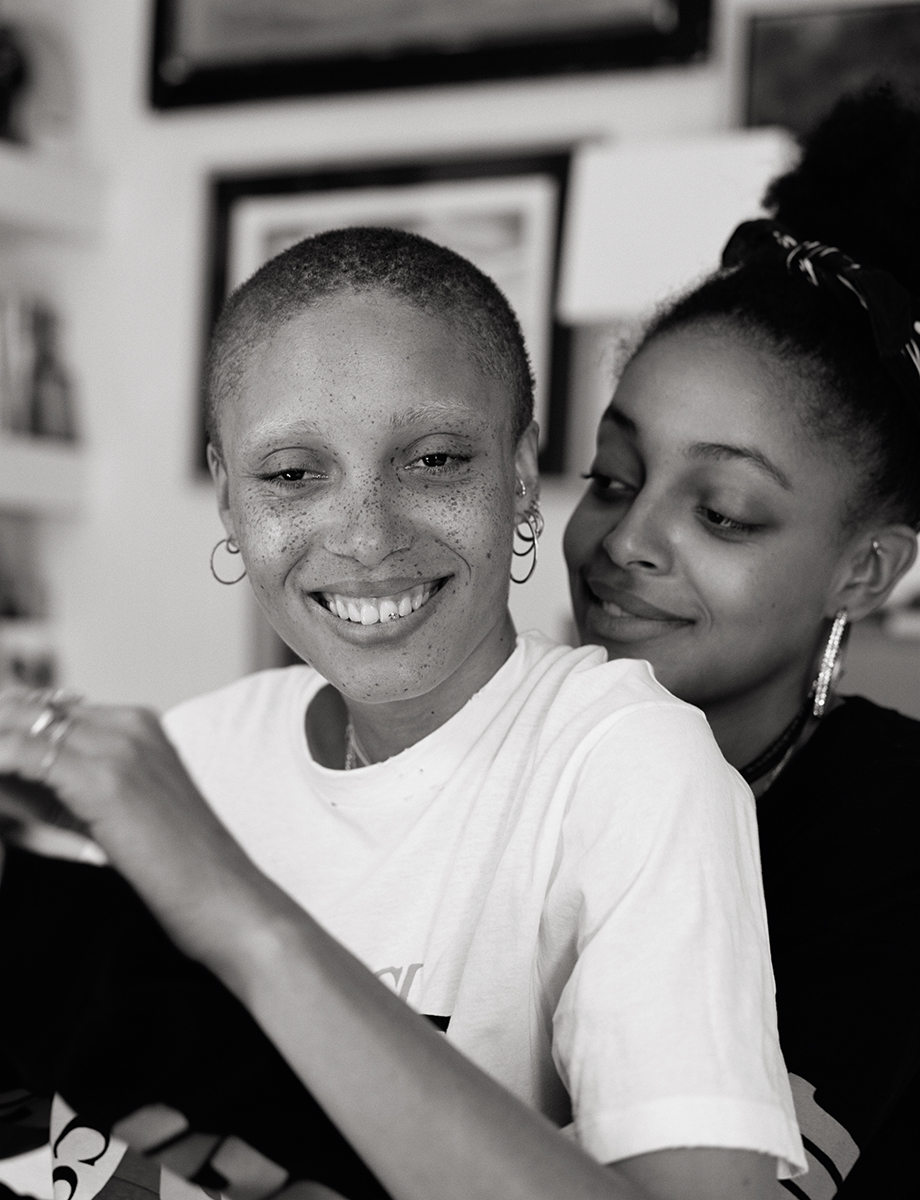
Returning from hospital marked the start of a slow and painful journey to rehabilitation, and to where she is now. “At the beginning I was very resentful to still be around,” she confesses. “I wasn’t happy to have been saved. After I returned from hospital, my family and I had to relearn how to treat each other, and what we thought about mental health and addiction. It was so difficult, and so hard for them to deal with someone who didn’t want to be there anymore. My relationship with my sister fell apart completely. She felt so let down that I didn’t in that moment think about how she would feel if I wasn’t there…” A road trip across America with her sister Kesewa, ending in New Orleans, and a family trip to Kenya that Christmas were both turning points on her road to recovery. “We were all sitting around the table in Kenya and it was like a snap back into reality,” Adwoa recalls. “I looked around and everyone was there and immediately I was so happy to be there too. I was so happy to be in a new place.”
The idea for Gurls Talk came after Adwoa attended a recovery meeting near her parent’s house in west London. The meeting, by chance, was all female. “All these women were sharing the most intimate details of their lives,” she recollects. “From their relationships with their husbands, to their exhaustion with their children, their sex lives… All the things one might feel too ashamed to talk about in front of men, or even in front of each other. But there was no competition, no judgment, no shame.” As each woman put her hand up to speak, another two or three would confess to feeling a similar way. It helped Adwoa recognize that the human condition is universal and whatever she was feeling, there was sure to be someone else feeling a very similar way. “I suddenly realized that I wasn’t on my own,” she reveals, “it made me think how beneficial it would be to just get girls talking.” She launched @gurlstalk on Instagram and bought the Gurls Talk domain name soon after.

With 35k Instagram followers and growing, and a website set to launch this October, Gurls Talk is the best friend you wish you had growing up, a voice to speak out on body image, feminism, self-perception, and empowerment. Frank, intelligent, and deeply personal, it documents everything from Adwoa’s road to recovery, to calling out the Kardashians for their use of social media (“Between you, you have 45 million followers, and this is what you use your platform for?” she asks incredulously), to insights into inspirational feminist artists and writers such as Gloria Steinem and Lena Dunham, to simple feel-good mantras (‘Be you and be proud’) “I find creativity a great tool,” Adwoa says. “Artists talk about issues such as depression, addiction, and sexuality freely through their work. It’s the same with writing. When I was undergoing treatment I never thought of myself as a good writer but getting things down on the page was therapeutic and I want to share this with other girls.”
With over 30 emails and direct messages from girls each week, Adwoa’s honesty first approach has seen her reputation snowball, with the Londoner fast becoming a go-to voice for young women and girls worldwide. “I’m happy I’ve taken on the responsibility, but it is a huge responsibility,” she says of her ever-growing community. “As soon as you start listening to what other girls are going through and you write back then you can’t just disappear. You have to be there, which can be quite overwhelming…” Especially for someone recovering from depression and addiction themselves. “I have to create boundaries,” she admits, “otherwise I’ll lie awake all night worrying about certain girls and how I wasn’t there to help them in person.”
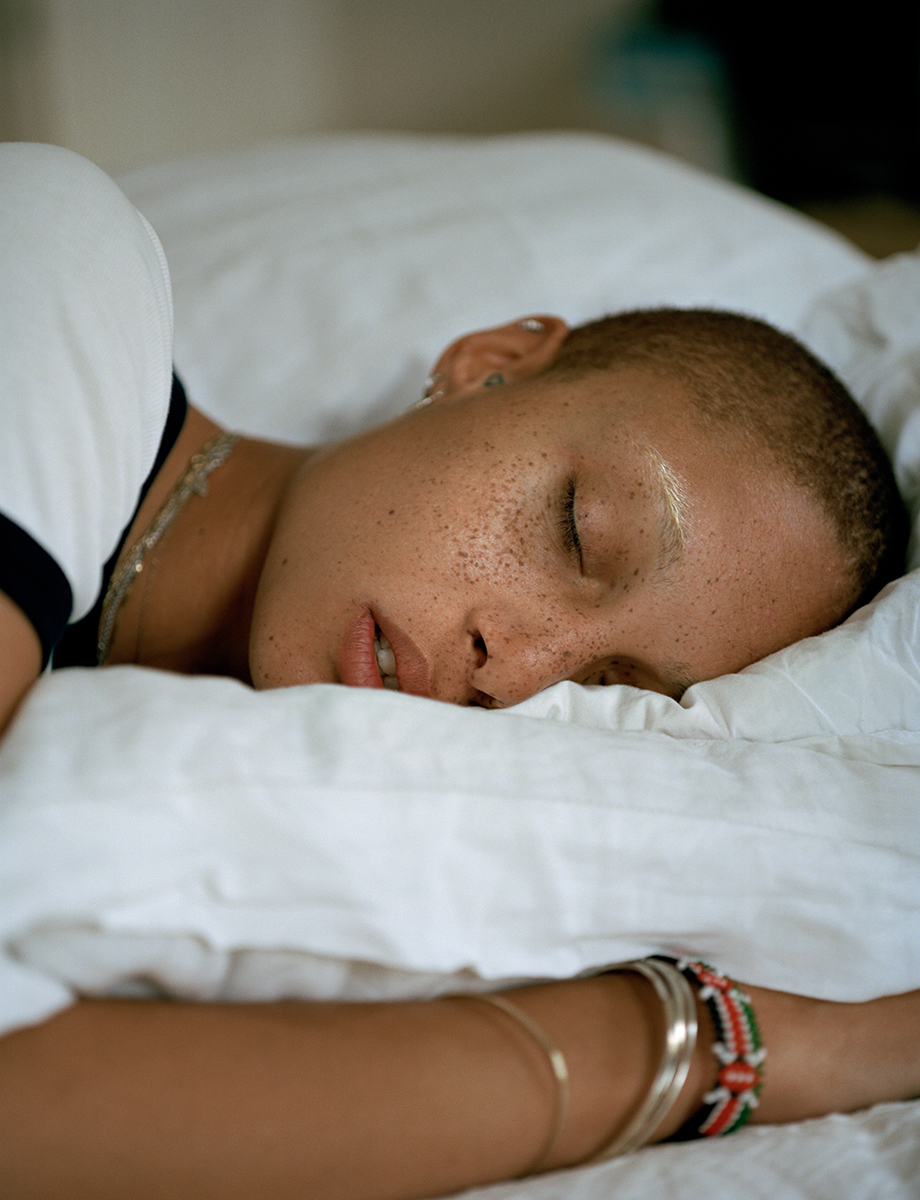
Despite the huge pressure she puts herself under, Adwoa believes it is her responsibility as a woman in the public eye to use her platform and voice to promote positive change. “This is 100% one of the biggest driving forces of Gurls Talk,” she says. “I don’t have as many followers as some people, but my numbers are growing. I want Gurls Talk to be less about me and more about the girls involved.” This March, Adwoa’s best friend, supermodel turned actress Cara Delevingne publically opened up about her battle with depression too, tweeting, “I suffer from depression and was a model during a particularly rough patch of self-hatred.” Shared more than 10,000 times it highlighted the huge absence of women, and men, discussing mental health issues in the public eye today. “I think a lot of celebrities are too afraid to speak out, but I don’t have that fear anymore,” Adwoa says. “If people don’t want to hear what I have to say, they don’t have to hear it. But if I can create some kind of change, if I can speak out about things that I’m not happy with, whether that’s in the fashion industry or beyond, then I will have made a difference.”
With one in four adults diagnosed with a mental health problem in the UK each year, 75% of whom receive no treatment (1), these are topics everyone should be educated on. “I had no idea what depression was, I had only seen it in films. I had no idea what addiction was — I thought it was someone lying in the street with a needle in their arm — but there are so many definitions of both,” Adwoa explains. With women almost twice as likely to be diagnosed with anxiety disorders as men (2), this is a female first issue too. And rather than a lesson in cold hard facts, Adwoa believes success will only be found through honest and identifiable female role models. “My goal with Gurls Talk is to give girls the chance to spend time with women they relate to — artists, writers, CEOs — women who inspire them and who can introduce them to new worlds and new professions after school,” she says.
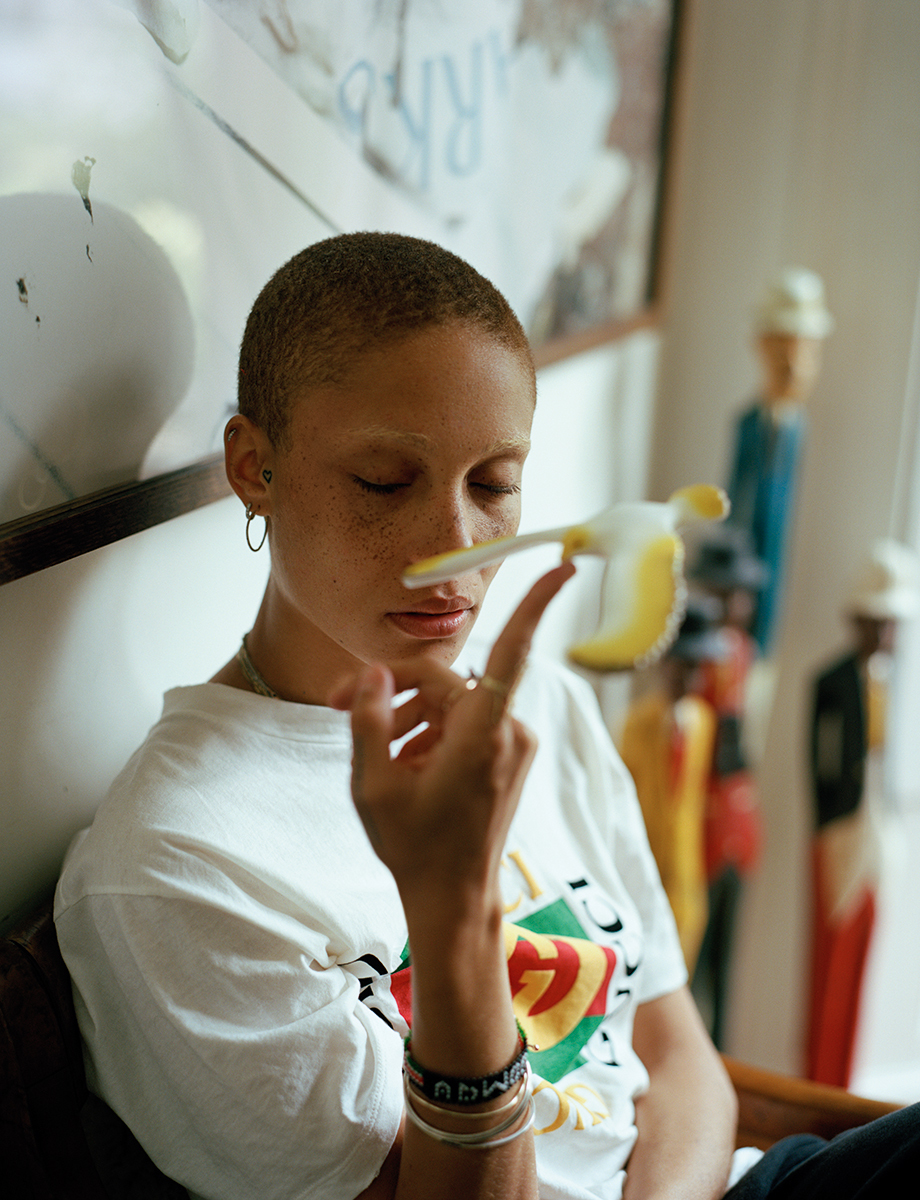
The most important message she would like girls to take away from Gurls Talk is, “be vulnerable, be open, and be true to yourself. I found when I was trying to be someone else everything was so much harder. But when I was true to myself, I felt so much freer,” she says, with a wisdom far beyond her years. “Give out positive energy and things will come back to you in ways you can’t even begin to believe.” Last year’s Italian Vogue cover shot by Tim Walker was a huge turning point for the model, who has since starred in advertising campaigns for Calvin Klein, Marc Jacobs, Roberto Cavalli, and H&M. “The Italian Vogue cover meant so much to me, not so much because I was on the cover,” Adwoa says, “but because I saw a different light in my eyes. There was nothing behind them for so long. I had completely shut away from my family, my friends, my sister, but now my spark is back.”
Adwoa’s spark is more than back, it’s dazzling, and the future looks bright for the her. Next year she will make her movie debut, starring in Rupert Sanders’ adaptation of Japanese manga classic Ghost in the Shell, opposite Scarlett Johannson. “It was a dream come true to act alongside Scarlett!” she beams. “She is one of the coolest and most down-to-earth women I’ve ever met.” First however, she needs to prepare for her debut Gurls Talk exhibition opening at Werkartz in LA this October, in partnership with Calvin Klein. Working with close friend Holly Gore, the exhibition will cover everything “from periods to porn” and “the taboo subjects that many women feel too embarrassed or ashamed to discuss.” With plans to recruit a Gurls Talk team by the end of the year, start touring schools in 2017 (with workshops dedicated to mental health, body insecurity issues, eating disorders, and sexuality, to name a few) and open her own education center a few years further down the line, Adwoa’s mission is to make the world a better, brighter place for the thousands of girls looking for big sister advice or a friend to turn to. “As a society we need to concentrate more on the emotional stuff,” she says. “Why is that not as important as the academic? We must learn to talk, share, and be honest about how we are feeling, because it’s only when we share our innermost thoughts and feelings that we regain our power.” In these turbulent times, an intelligent, passionate, and emotionally attuned role model is exactly what we need. Let’s get girls talking.
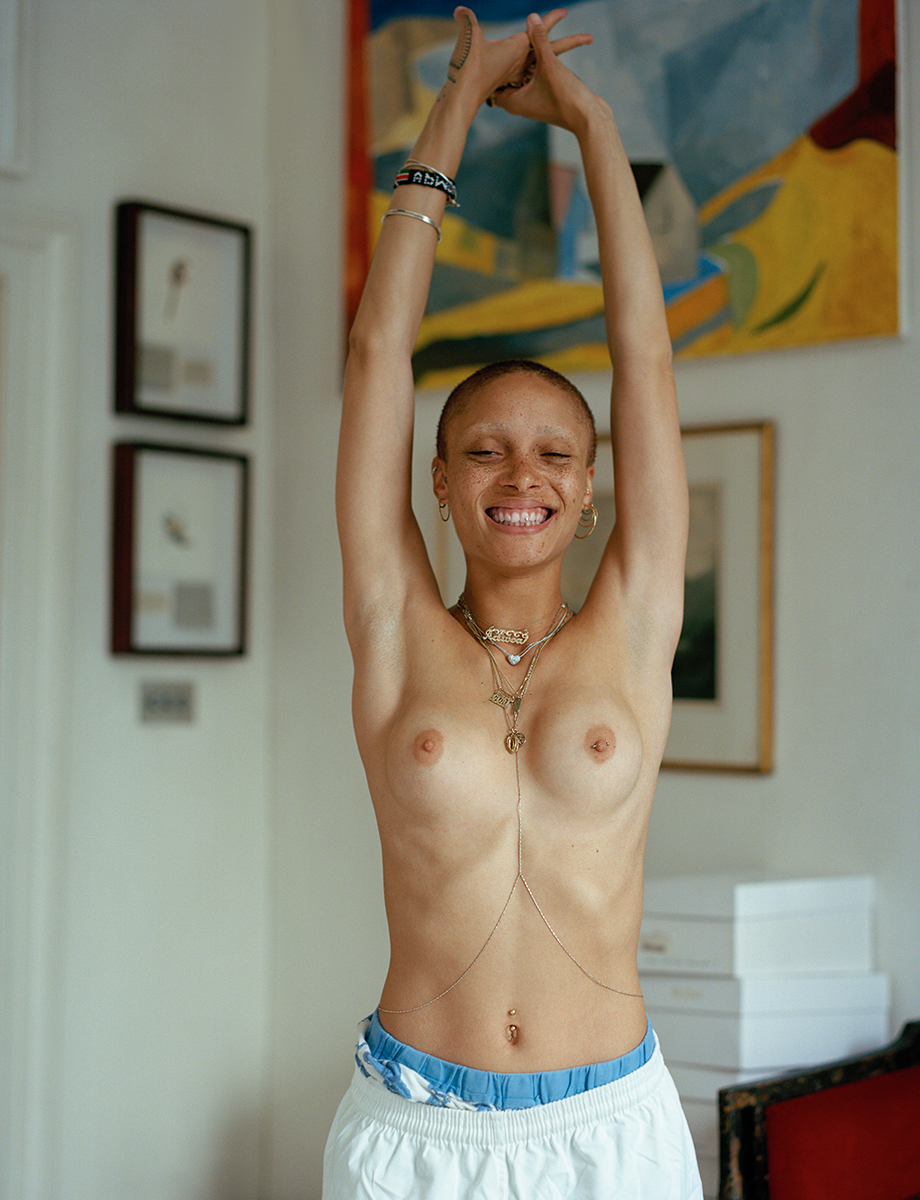
(1, 2) Statistics 2015 Mental Health Foundation Survey mentalhealth.org.uk
Credits
Text Holly Shackleton
Photography Letty Schmiterlow
Photography assistance Maxwell Tomlinson. Printed by Luke at Touch.
